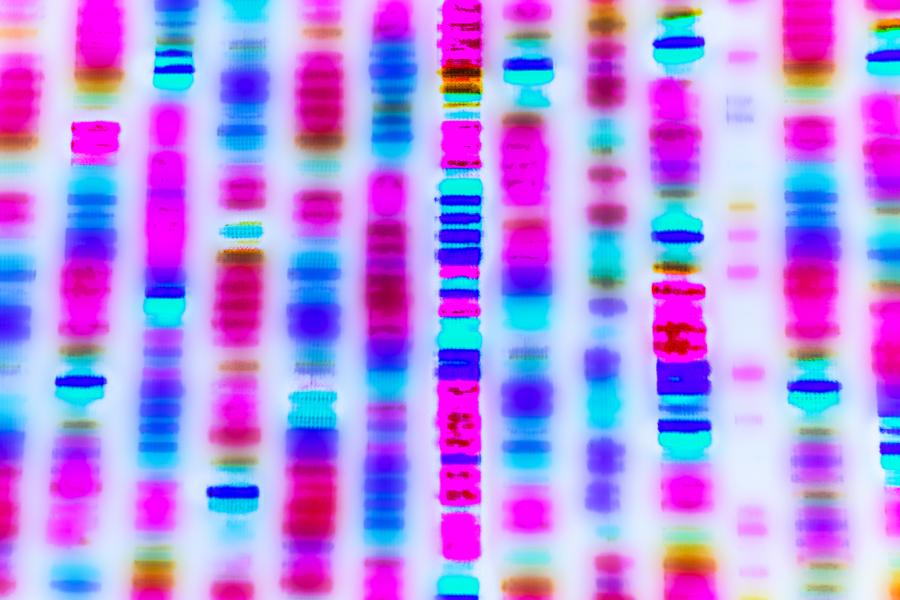The Y chromosome is perhaps the most puzzling part of the human genome. Associated with male development, it is chock-full of repetitive and inverted stretches of DNA, a hurdle that makes it challenging to put sections back together in the right order, let alone to assemble the Y chromosome in full.
But the last mysterious piece of the human genome has now been fully sequenced by a team of more than 100 researchers, including Johns Hopkins University scientists.
The achievement completes the Y chromosome's genetic code and unveils key details that could provide a crisper picture of the role the chromosome plays in male-specific development, fertility, and genetically triggered diseases like cancer.
"Now that we have this 100% complete sequence of the Y chromosome, we can identify and explore numerous genetic variations that could be impacting human traits and disease in a way that we weren't able to do before," says Dylan Taylor, a Johns Hopkins geneticist and doctoral candidate and the co–first author on the work published in August in Nature.
The sequence of DNA that makes up chromosomes encodes the genes and genetic circuits that guide the development and function of all cells in living organisms. The Y chromosome has been particularly challenging to decode because of its repetitive molecular patterns, but new technology and bioinformatics algorithms allowed the team to resolve these DNA sequences.
The team revealed the structures of sperm-regulating gene families and discovered 41 additional genes in the Y chromosome. They also unveiled the structures of genes thought to play significant roles in the growth and functioning of the male reproductive system.
"We completed the wiring diagram for all these genetic switches that get activated via the Y chromosome, many of which are critical to the genetic contributions to male development," says author Michael Schatz, a Bloomberg Distinguished Professor in Computer Science, Biology, and Oncology at Johns Hopkins. "We are at a point where scientists can start using this map. We were previously blind to different parts of the genome and different mutations, but now that we can see the whole genome, we hope we can add new insights to the genetics of a lot of different diseases."
The Y chromosome, along with the X chromosome, is often discussed for its role in sexual development. While these chromosomes play a central role, the factors involved in human sexual development are spread across the genome and are very complex, giving rise to the array of human sex characteristics found among male, female, and intersex individuals. These categories are not equivalent to gender, which is a social category. Additionally, recent work demonstrates that genes on the Y chromosome contribute to other aspects of human biology, such as cancer risk and severity.
The research was led by the National Human Genome Research Institute, part of the Telomere-to-Telomere consortium that in 2022 unveiled the complete sequence of a human genome, a decades-in-the-making revelation expected to open new lines of molecular and genetic exploration. However, that work was done with two X chromosomes. Now, using a donor with both an X and a Y chromosome, the consortium built a complete blueprint of the Y chromosome and every element of its DNA.
The new findings lay the foundation for high-quality genome assemblies that didn't exist before, including for personalized genomes.
Also see
"The genome is a very personal thing —it has the basic instructions for the building blocks of our development and what makes us human," says co-author Rajiv McCoy, a Johns Hopkins assistant professor of biology. "We knew we had an incomplete picture up until now, but we can now see the entire genome from end to end for the first time."
The Johns Hopkins group compared the new Y chromosome sequence against the genetic data from thousands of people worldwide. Their analysis spotted errors in the previous reference genome and showed how the new Y chromosome sequence will improve future studies of human DNA.
They are integrating the new insights into studies of primates both to dig deeper into the evolution of the Y chromosome and to analyze clinically relevant genes that could influence personalized medicine for pancreatic cancer and other diseases.
Posted in Science+Technology








